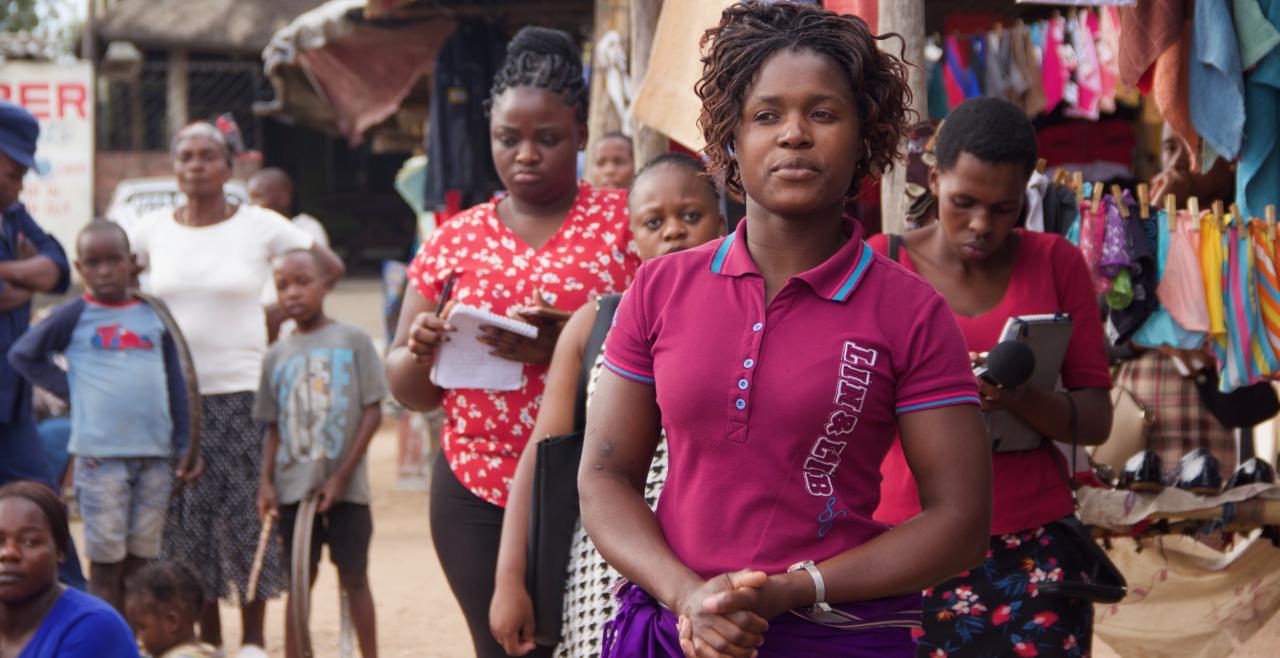Message from the Zimbabwe Spotlight Initiative on International Women's Day 2021

A little over one year since the pandemic struck, a myriad of studies and surveys have reported exacerbation of gender inequalities as women and girls continue to bear the brunt of unpaid labour, while being disproportionately at risk of violence compared to their male counterparts. The pandemic is indeed not only a health crisis but also a social one.
The COVID-19 pandemic and measures taken to curb the spread of the disease, such as national lockdowns, have resulted in what is now dubbed “The Shadow Pandemic”. Emerging data and reports from those on the front lines have shown that all types of violence against women and girls, particularly domestic violence, have intensified. Teenage pregnancies are also on the rise as a result of the lockdowns.
The world has come to understand that violence against women and girls is one of the most pervasive violations of human rights. Such a recognition illustrates that gender-based violence is not the result of women's and girls’ innate vulnerability but rather of deeply-rooted structural discrimination against women and girls that perpetuates gender inequality.
Gender inequality lies at the very root of gender-based violence and unless the issue is addressed, a future where women and girls live free from violence and discrimination is not attainable. Thus, while the COVID-19 pandemic continues and efforts to curb its spread intensify, now is the time to work hard to achieve gender equality in spite of the challenges the pandemic has revealed.
This is a matter of urgency as women are at the forefront of fighting the COVID-19 pandemic as healthcare and frontline workers, both at institutional levels and at home.
The Spotlight Initiative to eliminate violence against women and girls is critical now more than ever in the fight against gender-based violence in Zimbabwe.
The European Union (EU) has committed USD$21 million for phase 1 of implementation of the Spotlight Initiative and is leading the fight for gender equality. The Spotlight Initiative takes the EU political commitments to achieve the Sustainable Development Goals, and particularly SDG 5, to the next level.
The four-year Spotlight Initiative programme aims to:
- Ensure that Zimbabwe adopts and implements legislation that strengthens the constitutional provisions on gender equality to ensure effective prevention and response to all forms of GBV, and to strengthen institutions to be more gender-responsive in their overall mandates,
- Design programmes that advance the prevention of violence,
- Provide essential services to survivors, and
- Foster a strong social movement against violence and harmful practices at the national and sub-national levels.
Achieving gender equality and ending violence against women and girls can only be realized through a whole-of-society approach. For Zimbabwe to protect and ensure the rights of women and reap the benefits of engaging more than half of the population in COVID-19 recovery, a deliberate policy and strategic focus should include:
First, ensuring equal access to education. Gender inequality in education leads to higher fertility, higher child mortality, higher malnutrition, and lower education investments. Policies designed to boost enrolment would particularly help poor women and thus contribute to poverty reduction in income and non-income dimensions. In addition, the educational attainment and future financial status of children is more likely to reflect those of the mother than those of the father. Considering human capital is the most important prerequisite for growth, education and enhanced economic status for women are critical to meeting long-term development objectives.
Second, women must be drawn into the economic mainstream. The consequence of decline in women’s relative or absolute economic status has both an ethical and long-term economic implication. Any process of growth that fails to improve the welfare of the people experiencing the greatest hardship, broadly recognized to be women, has failed to accomplish one of the principal goals of development. In the long run, the low status of women would translate into slow economic growth.
Third, regulating and legalizing informal-sector employment where the majority of the female labour force (about 90 per cent according to some estimates) is employed would improve the economic status of women through facilitating access to credit and other services.
Fourth, increased participation of women in governance and political decision-making at all levels. Women’s empowerment either through affirmative action or other avenues is associated with improved governance and reduced corruption.
Gender equality is a critical economic issue for Zimbabwe, directly linked to growth and poverty reduction outcomes, and not a marginal social or women’s issue concerned with equity. Thus it should be prioritized as a matter of urgency for the country to progress.
The Spotlight Initiative, led by the UN Resident Coordinator, is being implemented by six UN Agencies (UN Women, ILO, UNDP, UNESCO, UNFPA and UNICEF) in partnership with the Government of Zimbabwe, Parliament, Independent Commissions, Civil Society, Academic Institutions, the Private Sector, and the Media and directly and indirectly targets 11 million beneficiaries, particularly rural women and girls, women and girls with disabilities and those living with HIV.
